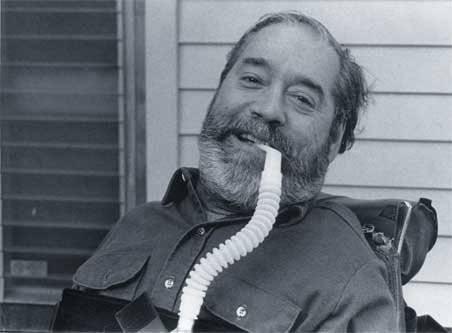
This guy is Ed Roberts. He was my dad’s best friend until he passed away in 1995, when I was 14. Ed got polio as a child, and it rendered him a quadriplegic. When he gave me wheelchair rides, he was steering with a joystick and one finger. He had to use a respirator at all times, and when he was at home, he was in an iron lung.
Ed was a bad-ass. He didn’t take any shit from anyone. He led the Independent Living movement, starting as a student at Berkeley in the mid-60s, then later as part of the first Jerry Brown administration in California. Disabled people had always been hidden away in the dark corners of society – Ed helped prove that it didn’t take much from the rest of us to given them the chance to lead full, independent lives. Just “reasonable accommodations." In the 60s, Ed flew across the country, from Berkeley to DC, without his respirator, endangering his life so he could testify before congress about the rights of the disabled.
My dad was working with Ed when the California laws that Ed helped write became the template for the Americans with Disabilities Act. Ed believed that people with physical disabilities deserved to live the same vibrant, independent lives that those of use who are lucky enough to be more able-bodied do. He was a fighter, and he and his fellow activists won the fight.
By the time he died in 1995, Ed could rely on curb cuts that allowed him to cross the street in his chair. He knew that if someone built a restaurant, they’d do reasonable things like have ramps in addition to stairs, so he could go out to eat with my dad, or his son Lee (called Little Lee, to distinguish him from my dad Lee), or his mom Zona, or whoever he wanted to go out to eat with. Every day, in a thousand different ways, the ADA gives people like Ed the opportunity that all of the rest of us take for granted.
There are some people who would prefer to think of the world in the abstract terms of a precocious eighth grader, and would prefer not to think about collective responsibility or about the advantages they’ve been handed. I learned from Ed that that BS doesn’t fly. I also learned that sometimes being a gentleman means putting up your dukes – even if those dukes are rhetorical. In Ed’s case, of course, they almost always were… though he wasn’t afraid to run over someone’s foot in his chair if he had to.
Anyway, I promise: no more politics. But hopefully this is a reminder: sometimes being a gentleman means doing what you can to enable others to live their lives fully.